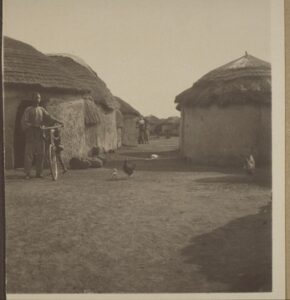Historically a  Muslim town in northern Ghana, Tamale today is a fast growing and rapidly diversifying city. Only in 1907 did Tamale become the colonial administrative center for the Northern Territories, and in its trail the bicycle arrived here forty years later than it did in the Southern part of the Gold Coast.
Muslim town in northern Ghana, Tamale today is a fast growing and rapidly diversifying city. Only in 1907 did Tamale become the colonial administrative center for the Northern Territories, and in its trail the bicycle arrived here forty years later than it did in the Southern part of the Gold Coast.
Once it did, it had a strong take off supported by a relative flat and dry terrain, and a crucial contribution to trading practices, rural livelihoods and youth culture. Regional colonial governance concentrated on rural development, a policy strategy which remained key after independence in 1957. This focus on agriculture explains the spatial intertwinement of the rural and the urban in and around the city. From the 1950’s onwards sturdy bicycles from China served as beasts of burden for farmers and traders. The last twenty years, secondhand city bikes from Japan dominate the cycling scene. This affected the profile of the many bicycle mechanics in Tamale. Since secondhand bicycles need to be reassembled before sale, bicycle repairers have become central retailers in the supply chain. The shift has also changed their work; they repair, modify, reassemble and recycle. Their creative contributions to sustaining bicycles as well as the central place of bicycles in youth culture guarantee a future for bicycles in Tamale: bicycles forever.
Tamale: Bicycles Forever is a collaborative effort between Sabine Luning of Leiden University, Samuel Ntewusu of the University of Development Studies in Tamale, and Gideon Asmah of Nuku Studio.